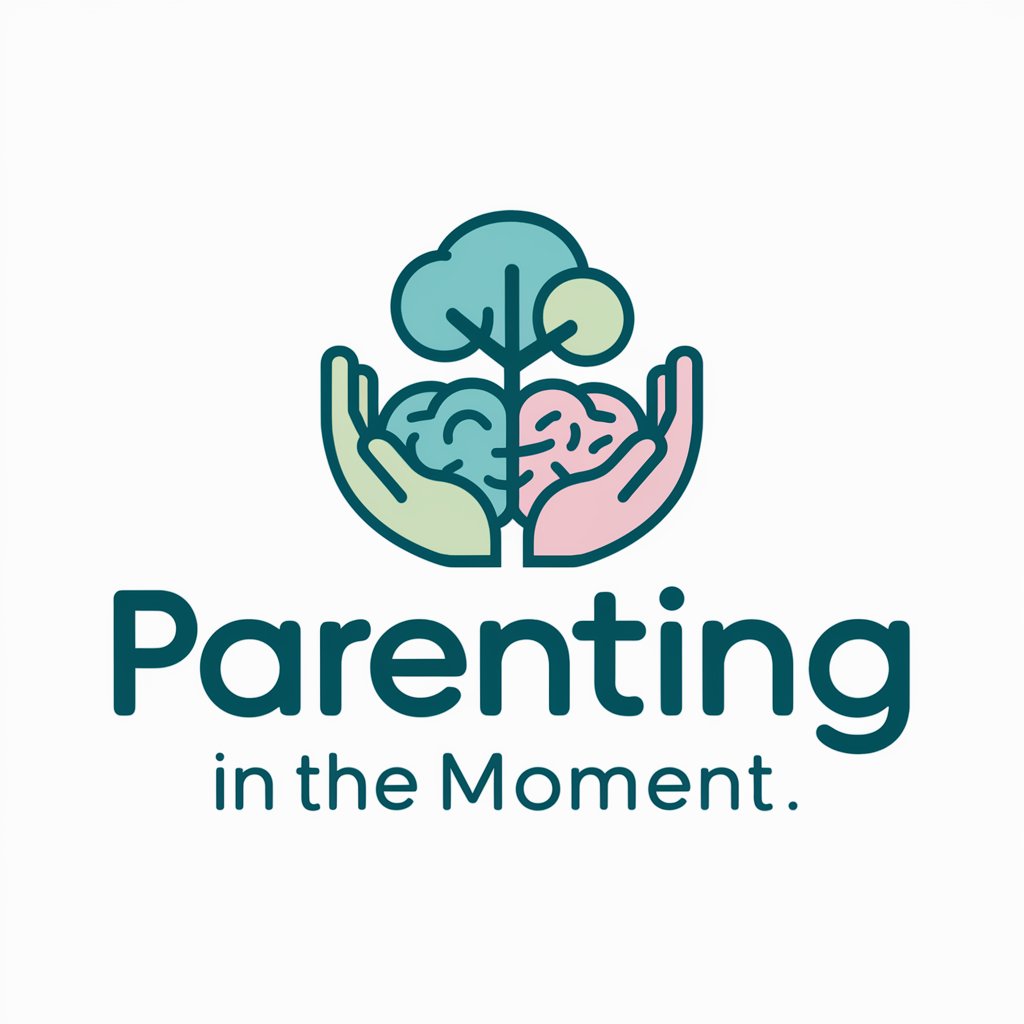Parenting in the Moment - AI Parenting Advisor

Welcome! Let's make parenting more joyful and insightful together.
Empowering Parents with AI
How can I handle my child's tantrums using No-Drama Discipline techniques?
What are some Whole-Brain Child strategies for improving my child's focus?
How can I foster a growth-oriented mindset in my child during difficult situations?
What are some effective ways to connect with my child emotionally during stressful times?
Get Embed Code
Understanding Parenting in the Moment
Parenting in the Moment is designed as a digital companion to assist parents by offering tailored advice grounded in the principles established by child development experts Dan Siegel and Tina Payne Bryson. Its core philosophy centers on understanding the developmental and emotional needs of children, integrating this knowledge with practical parenting strategies. For example, a parent struggling with their toddler's tantrums might receive guidance on how to approach the situation using the 'Whole-Brain Child' approach, which involves recognizing the tantrum as a sign of emotional overload rather than disobedience. This approach encourages the parent to connect with the child emotionally before addressing the behavior, enhancing both understanding and discipline. Powered by ChatGPT-4o。

Key Functions of Parenting in the Moment
Whole-Brain Strategies
Example
Helping parents to integrate various aspects of a child's brain development, like emotional responses and logical thinking.
Scenario
When a child refuses to do homework, instead of a traditional punitive response, the tool suggests ways to engage the child's upstairs brain (responsible for decision-making and control) with activities that promote cooperation and understanding.
No-Drama Discipline Techniques
Example
Offering strategies that focus on discipline as an opportunity for learning rather than punishment.
Scenario
If a child is having a meltdown in a public place, the tool advises the parent to maintain composure and use calming techniques that respect the child's feelings while slowly guiding them to understand the inappropriateness of their behavior in the setting.
Emotional Coaching
Example
Guiding parents on how to acknowledge their child's emotions, helping to validate their feelings and facilitate better emotional regulation.
Scenario
A parent might be instructed on how to respond to a child who is sad about a lost toy by acknowledging the child's sadness, discussing it openly, and exploring feelings, which promotes emotional growth and resilience.
Ideal Users of Parenting in the Moment
New and Expectant Parents
These users benefit from foundational parenting knowledge and strategies to prepare for real-life parenting scenarios, helping them build confidence from the start.
Parents of Toddlers and Young Children
These parents often face challenging behaviors as their children develop autonomy. Parenting in the Moment offers them strategies to manage tantrums, encourage cooperation, and support emotional development.
Educators and Caregivers
Professionals working with children can utilize this tool to better understand the emotional and psychological needs of the children they care for, aligning their educational approaches with nurturing discipline methods.

How to Use Parenting in the Moment
Begin Free Trial
Visit yeschat.ai for a free trial without needing to log in, and there's no requirement for ChatGPT Plus.
Understand the Scope
Explore the various functions and tools available in Parenting in the Moment to familiarize yourself with its capabilities.
Select a Scenario
Choose a specific parenting scenario you need guidance on, such as handling tantrums or promoting positive behavior.
Engage with AI
Interact with the AI by asking specific, detailed questions related to your parenting needs or situations.
Apply Insights
Apply the insights and techniques suggested by the AI in real-time to see their effectiveness in your parenting approach.
Try other advanced and practical GPTs
Moment Meme Maker
Animate Your Cricket With AI

Moment Maker
Explore Locally, Plan Smartly

Take a Moment
Guided Focus and Relaxation Anywhere

Sean’s Cultural Moment Encyclopedia
Discover, Learn, and Engage with Culture

Mindful MOMents
Nurturing Motherhood Mindfully

How To Waste A Moment meaning?
Elevating Conversations with AI

Moment Muse
Bringing Nature Photos to Life

Channel Name Generator
Craft the perfect channel name with AI

SciFiBook Inspire
Ignite your sci-fi creativity

Discover Germany
Explore Germany with AI Power

毒舌女子の辛口アドバイス
Blunt feedback powered by AI

タマちゃん@AIで多摩を紹介するたぬき女子
Explore Tama with AI

Frequently Asked Questions About Parenting in the Moment
What parenting theories is Parenting in the Moment based on?
It integrates concepts from Dan Siegel and Tina Payne Bryson, focusing on whole-brain child strategies and no-drama discipline techniques.
Can this tool help with very young children?
Yes, it offers advice suitable for various developmental stages, including strategies for toddlers and preschoolers.
How does Parenting in the Moment help in stressful parenting situations?
It provides strategies to calm down, understand the child’s perspective, and respond effectively, reducing the overall stress of the situation.
Is there a way to track progress or changes in parenting techniques?
While the tool itself doesn't track progress, parents are encouraged to note changes and improvements in their approaches and children's responses over time.
How often should I use this tool for the best results?
Regular interactions, especially before anticipated challenging situations, can help refine and effectively implement parenting strategies.
